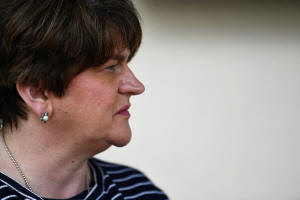Northern Ireland leader stands down, starts countdown for new government
 Send a link to a friend
Send a link to a friend
 [June 14, 2021]
By Amanda Ferguson [June 14, 2021]
By Amanda Ferguson
Belfast (Reuters) - Northern Ireland's
biggest parties have up to seven days to agree to go back into
government with each other after the Democratic Unionist Party's Arlene
Foster formally notified the assembly of her resignation as the British
region's First Minister on Monday.
The DUP is set to nominate social conservative Paul Givan to take over,
but if the nationalist Sinn Fein refuses to nominate a Deputy First
Minister, then the region's executive cannot function, and a snap
election could follow.
Sinn Fein insist the nomination for first minister and deputy first
minister be accompanied by the implementation of the cultural elements
of the New Decade, New Approach (NDNA) deal which restored the
power-sharing executive last year.

The agreement included protections for the Irish and Ulster Scots
languages to be delivered in the form of amendments to the 1998 Act that
established the devolved legislature after decades of direct rule from
London.
The new leader of the DUP, Edwin Poots, told BBC Radio Ulster on Monday
that he was "committed to all aspects of NDNA" but the Irish language
provision cannot be a precondition to the selection of a First Minister.
Foster, who took power in 2016, was ousted in April after a majority of
DUP lawmakers signed a letter seeking a confidence vote after many
blamed her for mishandling Brexit negotiations.
[to top of second column]
|

Northern Ireland's First Minister Arlene Foster looks on outside the
Strand Cinema, as coronavirus disease (COVID-19) restrictions begin
to ease in Belfast, Northern Ireland, May 24, 2021. REUTERS/Clodagh
Kilcoyne

Foster resisted compromise on the terms of Britain's
exit from the European Union when her party wielded huge power in
propping up the government of former British Prime Minister Theresa
May.
Her decision to throw her party's support behind May's successor
Boris Johnson then backfired spectacularly when he broke the party's
"blood red line" and agreed to Brussels' demand for trade barriers
between Northern Ireland and the rest of the United Kingdom.
The resulting Northern Ireland Protocol leaves Northern Ireland
within the EU's trading sphere, avoiding a hard border on the island
of Ireland but infuriating pro-British unionists by undermining the
region's place in the United Kingdom.
(Writing by Graham Fahy; Editing by Giles Elgood)
[© 2021 Thomson Reuters. All rights
reserved.] Copyright 2021 Reuters. All rights reserved. This material may not be published,
broadcast, rewritten or redistributed.
Thompson Reuters is solely responsible for this content.
 |